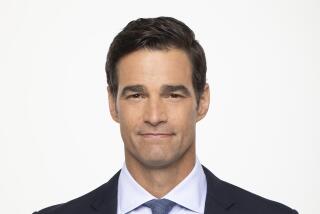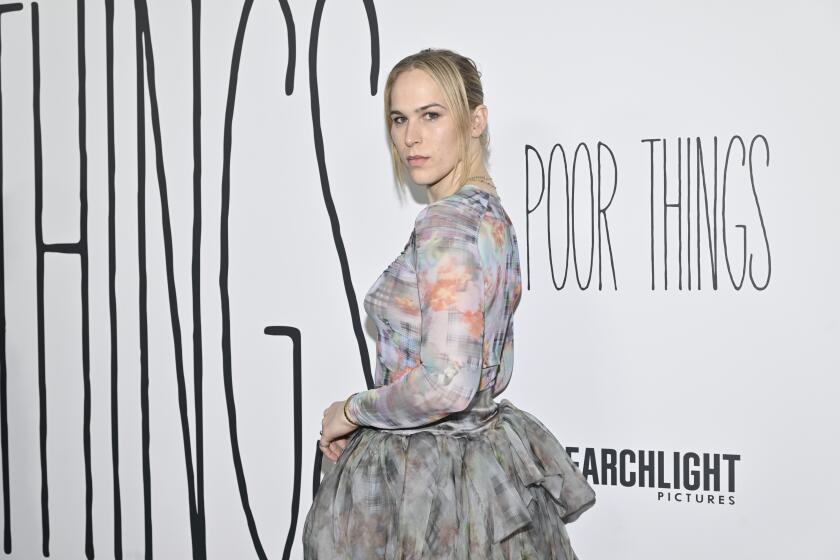It’s a Small World After All: Eisner, Ovitz United in Court
Their wives were close friends. Their Aspen vacation homes were a 10-minute drive apart. When one underwent heart surgery, the other kept vigil at the hospital.
But whatever personal chemistry Walt Disney Co. Chief Executive Michael Eisner and former Disney President Michael Ovitz enjoyed didn’t work professionally. So Eisner pushed out his friend, who never forgave or forgot.
Nearly eight years later, the two men find themselves joined again, this time in a Delaware courtroom. During a trial scheduled to start today in this small town, Ovitz and Eisner will be compelled to explain in detail why their relationship imploded. The reason: Shareholders have sued Disney board members, contending that Ovitz’s botched hiring and dismissal cost the company as much as $200 million in severance and interest.
Although Ovitz and Eisner barely speak to each other now, they must stand shoulder to shoulder to prove that though Ovitz’s parting was bitter, he was not fired for gross negligence or malfeasance. Were Ovitz guilty of such behavior, he could have been denied the rich cash-and-stock-option package he reaped.
If the plaintiffs prevail in the non-jury trial, any money awarded probably would be paid by the defendants’ insurance carrier -- not the board members themselves -- and returned to Disney’s treasury.
Based on pretrial depositions, Eisner is expected to argue that he engineered a once-in-a-lifetime coup by persuading Ovitz in 1995 to give up his position as Hollywood’s most powerful agent to become Disney’s second-in-command. At the same time, he must demonstrate that Ovitz’s performance at Disney was flawed -- bad enough to cost him his job but not so bad as to cost him his severance.
Ovitz has his own fine line to walk. He is expected to accuse Eisner and other Disney executives of undercutting him. But he too will argue that Eisner acted properly in easing him out and clearing the way for the severance because the arrangement simply did not gel.
Ovitz lawyer Mark Epstein said his client “worked incredibly hard during the time he was at Disney and the evidence will show that he was entitled to all of the payments that he received.” Eisner lawyer Gary Naftalis said that Disney directors were fully involved in consulting Eisner on Ovitz’s hiring and firing. He added “that upon termination, Mr. Ovitz received not one penny more than his contract required.”
Lawyers for Eisner and other directors contend they acted in the best interests of shareholders by protecting the company from a breach-of-contract suit that almost certainly would have been filed had they denied Ovitz his payout. That, they say, could have cost far more than the severance package.
For both Eisner and Ovitz, their performances on the stand will be dissected not only by the presiding judge, Chancellor William B. Chandler III, but by self-appointed jurors in executive suites and on studio lots throughout Hollywood. With their penchant for playing hardball, Eisner and Ovitz are two men whom much of the industry loves to hate. The prospect of the pair delivering up embarrassing details about each other is thrilling to many.
As veteran talent manager Bernie Brillstein put it: “It will be better than watching ‘Desperate Housewives.’ ”
The show is expected to last about a month, with testimony from Ovitz beginning sometime next week after the shareholders’ attorneys present several expert witnesses drawn largely from academia. Among other things, they will argue that Ovitz should have been fired “for cause” and discuss the value of Ovitz’s payout when he left in 1996. Ovitz ultimately received $109 million.
Known for being “16 miles from anywhere,” Georgetown is about as far as it gets from Hollywood. Its 4,811 residents amount to less than 25% of the total people employed by Disneyland Resort in Anaheim. The trial is taking place in Delaware because of the state’s business-friendly laws, which have encouraged Disney and many other major companies to incorporate here.
That the case got this far is, in a sense, as surprising as finding Eisner and Ovitz on the same side. Legal experts say it’s rare for such shareholder cases to make it to trial because companies nearly always find it cheaper to settle.
Sources close to the case say proposed offers to settle the claims were floated but were rejected by American International Group Inc., the liability insurance provider for Disney directors. An AIG spokesman could not be reached.
Representing the plaintiffs is Milberg Weiss Bershad & Schulman, a firm that specializes in representing shareholders of publicly traded companies. Attorney Steven Schulman said the case was moving forward because Disney directors egregiously rubber-stamped both Eisner’s hiring of his friend and his decision to let Ovitz off the hook with a “no-fault termination,” requiring Disney to pay him off.
“It’s about a highly paid No. 2 executive who completely took advantage of his company and his shareholders,” Schulman said.
For the defendants, the case is about more than money.
Eisner and Ovitz share a common goal of using the trial testimony to burnish their respective reputations, although documents already amassed in the case do little to facilitate that goal.
Eisner, who has said he will retire when his contract expires in 2006, has been credited with building Disney into a multibillion-dollar entertainment conglomerate. But in recent years, he has been criticized for the company’s poor financial performance and for the loss of key executives.
In March, Eisner endured a stinging rebuke by shareholders unhappy with his management of the Burbank-based entertainment giant. That effort was led by former directors Roy E. Disney and Stanley P. Gold, who also are defendants in the Delaware case because they served on Disney’s board when Ovitz was hired.
For Ovitz, the tiny Delaware courtroom offers a chance to rehabilitate an image that never fully recovered after he tumbled from Hollywood’s highest perch.
His firm, Creative Artists Agency, represented numerous A-list actors and directors, including Tom Cruise, Dustin Hoffman, Barbra Streisand and Steven Spielberg. He will contend in court, according to deposition testimony, that after Eisner lured him away, he “never came out and took my back. Ever.”
In more than 1,000 pages of court filings, Ovitz tells of arriving at Disney flush with ideas on how to improve the company and mend its frayed relations with stars and directors. He said he wanted to buy a publishing company, maybe a half-interest in Sony Music.
But, as he tells it, he ran into an insular corporate culture staffed with executives who undercut him as Eisner stood by.
The night before his appointment was announced, Ovitz recalled in court papers, Disney’s then-chief lawyer Sandy Litvack and then-Chief Financial Officer Steve Bollenbach told him they would refuse to report to him.
“Every time I went to do something, someone pulled the rug out from underneath me,” Ovitz said in a deposition. He said he pleaded with Eisner to support him, to no avail.
Eisner’s take is vastly different. In often scathing language filed in court documents, he described Ovitz as something akin to a “junior partner” who failed to make the cut. He is quoted in documents as saying that Ovitz had “pathological problems,” that “nobody trusts him for he cannot tell the truth” and that he was someone who “played the angles too much” at Disney.
Ultimately, Eisner said, “I questioned my judgment in putting us together.”
That sentiment certainly was a long way from the awe that greeted news of Hollywood’s new power couple.
“Forrest Gump” producer Steve Tisch said at the time that “the headline on the paper should be, ‘Disney Reveals They Are Developing a Nuclear Arsenal.’ ” Miramax Film Corp. chief Harvey Weinstein said: “I think the other studios might just as well throw in the towel.”
But when the breakup came, it was not entirely a surprise to Hollywood insiders. In a town that trades on gossip, word leaked out that the business -- and personal -- relationship between the Michaels was souring.
Now that gossip will turn into testimony.
“I’ve never seen anything quite like this,” said Los Angeles securities lawyer Michael Perlis, who has been following the twists and turns of the case. “Everybody has to tread carefully, yet at the same time each of these constituencies is going to stake out its own position to protect itself from the others.”
*
Times staff writer Claudia Eller contributed to this report.
More to Read
The biggest entertainment stories
Get our big stories about Hollywood, film, television, music, arts, culture and more right in your inbox as soon as they publish.
You may occasionally receive promotional content from the Los Angeles Times.







